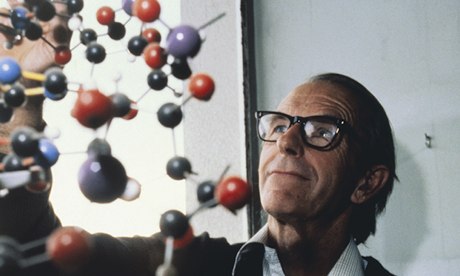"Nothing is too wonderful to be true, if it be consistent with the laws of nature"-Michael Faraday-  |
| Frederick Sanger, two time Nobel laureate in Chemistry, died November 19th 2013 at the age of 95. |
This modest genius revealed some very fundamental secrets about biological life. Dr. Sanger worked out the chemical structure of proteins during his work with insulin, the biological field knew that amino acids were the basis for protein structure but did not consider the significance of the ordering of them. Sanger explored the significance of the orders of amino acids and with his ingenuity worked out the complete structure of proteins.
Proteins are important molecules and are abundant in any living organism. They are responsible for building cellular structures, maintaining them and protecting them from viruses (for example the protein immunoglobulin which is an antibody). Sanger's work sparked great movement in medical research, genetic research and the whole of biology. This won him his first Nobel prize in Chemistry.
The work on the chemical structure of proteins and ordering of amino acids led Sanger to the question of how the information in DNA constructs proteins. He developed one of the first methods in DNA sequencing, which is the process that determines the ordering of nucleotides in a DNA strand.
DNA sequencing allows biologists to probe further into the nature of genes, how they are sequenced in the body and possibly when they will become activated. This obviously has huge importance medically as biologists can identify which clusters of genes cause certain affects in the living organism and the possibility of interfering for the benefit of the organism. Sequencing is a very common research technique used in institutions who are keen to understand the properties and mechanisms of genes and proteins.
His body is undergoing decomposition and centuries later his corpse will be nothing but bones.
However his contribution to science and the understanding of nature will survive far into the future.

No comments:
Post a Comment